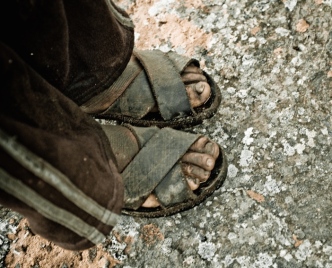Read Luke 4:16-19.
Though this story is of Jesus reading from Isaiah, the imagery is no less provocative. Here we have Jesus, just starting in his ministry, immediately after his baptism and temptation in the desert, essentially coopting these words from Isaiah to describe himself. So, you can see why some feathers might have been ruffled. I mean, for people of Jewish faith, the Messianic prophecies are the promises that they cling to. And for this person, who none of them had met before, to come in and start interpreting the prophet’s words as his own, that didn’t sit well with any of them.
But maybe more than designating himself as the one Isaiah was referring to, perhaps Jesus’ greatest affront, in their minds, was how he was suggesting the Messiah would be. See, the common belief in Jewish communities was that the Messiah, sent by God to save the people of Israel, would be a great warrior-king who would vanquish their enemies and establish Israel as a great nation that would rival and even be more impressive than the Roman empire, under whose rule they lived. And so for Jesus to be using words from Isaiah about bringing good news to the poor, the blind, the oppressed, and the prisoners to describe what the Messiah would actually be like was completely dismantling all of their ideas about the one through whom God would save the world.
 I remember one day in Gospels class at seminary, someone using the phrase, “God’s preferential option for the poor.” And I remember struggling with that. “Why should God have a preference for the poor?” I wondered to myself. As a kid who grew up in a middle-class neighborhood, to hear that God “preferred” someone else really rubbed me the wrong way. I won’t say that I don’t still struggle with this idea, but I’ve come to reinterpret the phrase, not as “God’s preferential option for the poor,” but as “God’s preferential treatment of the poor (oppressed, marginalized, outcast, voiceless…).” See, Jesus was right in quoting Isaiah; the Gospel as revealed through Jesus the Christ is one of liberation and healing and sight and freedom.
I remember one day in Gospels class at seminary, someone using the phrase, “God’s preferential option for the poor.” And I remember struggling with that. “Why should God have a preference for the poor?” I wondered to myself. As a kid who grew up in a middle-class neighborhood, to hear that God “preferred” someone else really rubbed me the wrong way. I won’t say that I don’t still struggle with this idea, but I’ve come to reinterpret the phrase, not as “God’s preferential option for the poor,” but as “God’s preferential treatment of the poor (oppressed, marginalized, outcast, voiceless…).” See, Jesus was right in quoting Isaiah; the Gospel as revealed through Jesus the Christ is one of liberation and healing and sight and freedom.
God’s good news for all of us is that we are no longer enslaved by those things that try to rule our lives. God, through Jesus, has set us free to be loved and to love others.
Mary’s Song of Praise (The Magnificat) – Luke 1:45-55
And Mary said,
‘My soul magnifies the Lord, and my spirit rejoices in God my Savior, for he has looked with favor on the lowliness of his servant. Surely, from now on all generations will call me blessed; for the Mighty One has done great things for me, and holy is his name. His mercy is for those who fear him from generation to generation.
He has shown strength with his arm; he has scattered the proud in the thoughts of their hearts.
He has brought down the powerful from their thrones, and lifted up the lowly;
he has filled the hungry with good things, and sent the rich away empty.
He has helped his servant Israel, in remembrance of his mercy,
according to the promise he made to our ancestors, to Abraham and to his descendants for ever.’
Questions for reflection: What does God’s preferential treatment of the poor, oppressed, marginalized, and voiceless say to you about how we are to be in the world? How might uphold those who are oppressed, give to those who are without, and be voices for those without a voice?
